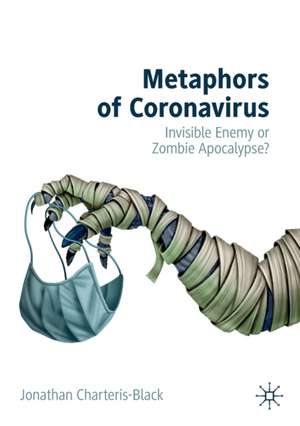Metaphors of Coronavirus: Invisible Enemy or Zombie Apocalypse?
Autor Jonathan Charteris-Blacken Limba Engleză Paperback – 13 noi 2021
Preț: 179.48 lei
Nou
Puncte Express: 269
Preț estimativ în valută:
34.35€ • 35.64$ • 28.71£
34.35€ • 35.64$ • 28.71£
Carte disponibilă
Livrare economică 22 februarie-08 martie
Livrare express 08-14 februarie pentru 26.74 lei
Preluare comenzi: 021 569.72.76
Specificații
ISBN-13: 9783030851057
ISBN-10: 3030851052
Pagini: 304
Ilustrații: XVI, 301 p. 10 illus. in color.
Dimensiuni: 148 x 210 x 24 mm
Greutate: 0.38 kg
Ediția:1st ed. 2021
Editura: Springer International Publishing
Colecția Palgrave Macmillan
Locul publicării:Cham, Switzerland
ISBN-10: 3030851052
Pagini: 304
Ilustrații: XVI, 301 p. 10 illus. in color.
Dimensiuni: 148 x 210 x 24 mm
Greutate: 0.38 kg
Ediția:1st ed. 2021
Editura: Springer International Publishing
Colecția Palgrave Macmillan
Locul publicării:Cham, Switzerland
Cuprins
1. The Moral Frames and Coronavirus.- 2. Metaphors of the Pandemic: War.- 3. Metaphors of the Pandemic: Fire and Force of Nature.- 4. The Pandemic as Zombie Apocalypse.- 5. Epidemiology: Science, and Metaphor.- 6. Disease, Confinement & Language.- 7. ‘Bubbles’, ‘Cocoons’. The ‘Protective Ring’ and the ‘Petri Dish’: The Containment Frame and the Pandemic.- 8. Metonyms of the Pandemic.- 9. Magic, Miracle Cures and Metaphoric Thought in the Anti-Vaccine Movement.- 10. Honesty and Dishonesty in Pandemic Language.
Recenzii
“This book has many strengths and is an important and valuable contribution to cognitive linguistics and political communication fields, which obviously benefits from contemporary relevance to the ongoing crisis. Metaphors of Coronavirus is well worth reading by anyone – academic or lay person – with an interest in understanding the linguistic and communicative dynamics of the Coronavirus pandemic. … The takeaway message of this book is, for me, that metaphor is simply a linguistic tool and is not inherently dishonest.” (Emily Faux, Journal of Language and Politics, Vol. 21 (6), 2022)
Notă biografică
Jonathan Charteris-Black is Professor of Linguistics at the University of the West of England, UK. His research interests include metaphor, rhetoric and political discourse.
Textul de pe ultima copertă
"In this timely, wide-ranging and inspiring book, Jonathan Charteris-Black provides detailed and critical insights into the key roles played by metaphor and metonymy in framing the debate around the Covid-19 pandemic. He shows how, through their strong appeal to emotion, metaphors and metonyms form part of an ‘overt moral coercion’ which reduces the agency of those living through the pandemic. This book deepens our understanding of the ways in which the use of metaphor and metonymy can be used to shape behaviour, providing important insights into the collective experience of the pandemic. The chapter on metonymy is particularly illuminating as it highlights the different ways in which thought and behaviour during the Pandemic have been influenced by this highly subtle and nuanced form of communication which has been employed both in verbal format and through the use of images."
-Jeannette Littlemore, Professor of English Language and Applied Linguistics, University of Birmingham, UK
"This is a highly engaging, personal and lucid analysis of the figurative language used in the COVID-19 pandemic to 'make sense' of its threat to society and of the chances to counter it. Using both corpus-based and experimental survey methods, Charteris-Black expertly analyses key metaphors, metonymies and allegories about the virus, its worldwide spread and its medical management and relates them to fundamental parameters of moral judgement, leading to fascinating new insights."
-Andreas Musolff, Professor of Intercultural Communication, University of East Anglia, UK
Caracteristici
Examines familiar metaphors including the virus as a war, as an allegory, as an alien invader, and as a fire Draws on moral foundations theory to understand why different metaphors are used, as well as their effects Looks in-depth at how science is communicated to the public in light of a major global pandemic
